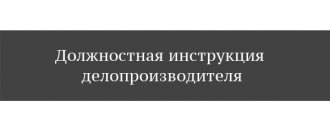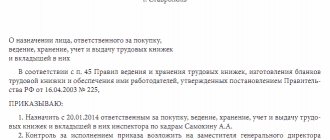What is this standard?
The professional standard of a secretary includes:
- a list of labor functions, the performance of which is provided for by this profession;
- a list of knowledge, skills and abilities relevant for each of the job functions;
- an indication of the educational level and work experience relevant for each of the job functions.
In addition, the professional standard provides for the use of encodings: OKZ and OKVED, which is especially important for maintaining statistics.
Despite the significant difference in working conditions in production and in various institutions, the professional standard is a kind of average denominator by which the quantity and quality of work performed is determined.
Essentially, this is a tool for unifying all the requirements and criteria that employees must meet in the position of secretary to the head of the company.
https://youtu.be/Kg0Cf1jXOYg
WHAT ABOUT BUDGET EMPLOYEES?
The situation is somewhat different in budgetary (state and municipal) organizations. On June 27, 2016, the Government of the Russian Federation adopted Resolution No. 584 “On the specifics of the application of professional standards in terms of the requirements mandatory for the application of state
state extra-budgetary funds of the Russian Federation, state or municipal institutions, state or municipal unitary enterprises, as well as state corporations, state-owned companies and business entities, more than fifty percent of the shares (shares) in the authorized capital of which are in state or municipal ownership" (hereinafter - Resolution No. 584).
According to Decree No. 584:
1. Professional standards are applied in terms of qualification requirements necessary for an employee to perform a certain job function, established by the Labor Code of the Russian Federation, other federal laws, acts of the President of the Russian Federation, the Government of the Russian Federation and federal executive authorities.
2. Professional standards are applied in stages on the basis of plans approved by the specified organizations for organizing the application of professional standards (hereinafter referred to as plans, see Example).
3. Plans are approved by the specified organizations, taking into account the opinions of the representative bodies of workers.
4. Plans must contain:
1) a list of those professional standards that are subject to application in this organization;
2) information about the needs of employees for vocational education, vocational training and (or) additional vocational education of employees, which must be obtained on the basis of an analysis of:
• qualification requirements contained in professional standards;
• personnel composition of organizations specified in Resolution No. 584;
3) information on the implementation of education and training activities in the prescribed manner;
4) stages of application of professional standards;
5) a list of local regulations and other documents, including on the following issues:
• certification;
• certification;
• other forms of employee qualification assessment,
subject to change in connection with the provisions
professional standards to be applied in this organization.
5. The implementation of planned activities must be completed no later than 01/01/2020.
6. Higher organizations in relation to the organizations specified in Resolution No. 584, exercising control and coordination of their activities, must ensure:
a) adjustment of local regulations and other documents that require taking into account the provisions of professional standards to be applied;
b) control over the implementation of planned activities.
When new professional standards appear, they are prescribed to be implemented in a similar way.
What is the purpose of creating a professional standard for a secretary?
The purpose of creating the standard is to optimize personnel policy in production. It is easier for a manager to evaluate the professional qualities of employees, focusing on the requirements of the standard.
At the same time, the standard is also relevant for the vocational education system. The teaching methodology in those educational institutions where training programs for training secretaries are implemented is focused specifically on the professional standard. Students of these institutions have the opportunity to clearly understand the range of their responsibilities in their future work.
It will be easier for them to navigate the nuances of their future profession. Additionally, knowing the current standard at the time of employment is an added bonus when creating your own resume.
What should a secretary's job description contain: examples and sample documents
The work of a secretary is characterized by multitasking and the need to do everything at once, because otherwise the entire work of the company could go awry.
This is interesting: Cost calculation in 1s unitary enterprise
In this article we will tell you how to correctly draw up a job description for a secretary, and also present several ready-made versions of this document.
Clerk secretary
At the following link we have posted a document suitable for a secretary with clerk functions: https://yadi.sk/i/CsoTnmdn3Towm8
Secretary-referent
The functional responsibilities of the assistant secretary are somewhat different from the standard ones: https://yadi.sk/d/HkLeZDDk3Towqt
Office manager with secretary functions
To find a sample instruction manual for this employee, click here: https://yadi.sk/i/f0eXKy2b3Towyi
Training part
Depending on the institution, the job description of the secretary of the educational unit may be as follows:
- college: https://yadi.sk/i/wTooxnf53ToxdB
Secretary-typist
The job description of this employee is posted here: https://yadi.sk/i/DWMKYFdi3Toxk6
Court hearing
You can read the instructions of the district court secretary at the following address: https://yadi.sk/i/lyTkislj3ToyCa
Here is a document suitable for the secretary of a magistrate: https://yadi.sk/i/jY00M73g3ToyMt
Press Secretary
You can see the press secretary's instructions here: https://yadi.sk/i/J4nElPMU3ToyZ3
Scientist
At the following link we have posted a document for the scientific secretary of the council: https://yadi.sk/d/oDtIaJqf3Tp2jq
Executive secretary of the newspaper
The labor functions of the executive secretary of the newspaper look like this: https://yadi.sk/i/9fxgAyws3Tp2zZ
Receptionist
To find a document form for the reception secretary, click here: https://yadi.sk/i/7RXepLQl3Tp3Me
Secretary-administrator
The following link contains instructions for the secretary with administrator functions: https://yadi.sk/d/k93AVPJP3Tp3W7
Corporate secretary of a joint stock company
The job description of this employee is posted here: https://yadi.sk/d/YNcunY4p3Tp3nN
Juvenile Affairs Commissions
The secretary of the commission on juvenile affairs must work according to instructions of the following kind: https://yadi.sk/i/w4PdYv7x3Tp3yV
In children's educational institutions, the following instructions are used: https://yadi.sk/i/bSOYXr3G3Tp46s
Structural features of the secretary's professional standard
In the official list, the professional standard for the manager’s secretary is number 447 and is officially called the Professional Standard “Specialist in organizational and documentation support for organization management.”
Structurally, it is divided into several parts:
- General information. This subsection specifies the encoding and indicates the purpose of creating the secretary position itself. The full title of the position is also given here.
- Functional map. This subsection provides a complete list of job functions. It is also noted here which qualification category an employee in this position must correspond to.
- Description of labor functions. This subsection specifies the list of works, skills and responsibilities assigned to the employee.
- Imprint about the developers. The subsection contains an indication of who and when the standard was developed.
The clarity of the wording of the professional standard of a secretary is due to the specifics of his work. The orderliness of the entire working day of the institution depends on the degree of organization of the employee in this position.
The secretary sets the tone for business communication and the working rhythm of everyday life in the office. The professional viability of a manager largely depends on his professional preparedness.
Often the secretary is the link between all production departments. Various streams of information flock to it, which, in turn, must be classified and distributed accordingly.
The goal of creating a professional standard for a secretary also involves the introduction of innovative developments in the field of distribution and storage of confidential information. In particular, a secretary of any qualification category must be able to use technical means or software to organize voice or conference calls, as well as master technical techniques for protecting confidential information.
What parts does the professional secretary standard consist of?
Like any other documents of this kind, professional standard No. 447, approved for executive secretaries, has the following structure:
- General information about the type of activity and its main purpose.
- Functional map for the activities of the secretary.
- Characteristics of individual professional functions assigned to this specialist.
- List of organizations that took part in the preparation of the professional standard.
Now let’s look at the contents of the main sections, with the exception of the last one, in more detail.
What is unique about the secretary's functional card?
The third part reflects a detailed list of professional responsibilities. To successfully perform each of the prescribed duties, there are qualification categories that the employee must meet in this position.
There are only 6 qualification levels. Their gradation depends on the experience, professional skills and overall length of service of the employee. They are fixed according to a certain system provided for by the standard.
The main functions, presented in general form, are:
- Information support for the manager on current issues.
- Organization and servicing of conference events.
- Organized collection of professional information.
- Documentation of incoming information and its systematization.
- Creating optimal working conditions for the head of a company, firm or enterprise.
- Preparing the manager’s workplace and creating a business atmosphere in the office.
The manager's secretary should not be just a statistic, receiving corporate or production information. He must analyze the information received from colleagues, department heads, clients, and ordinary employees.
The analytical approach to collecting professional information is that the secretary ranks the information received by degree of importance and selects the most urgent ones for presentation to the manager.
Scientific secretary and his duties
This position is in the field of science. Scientific secretaries are in demand in universities, research institutes, academies, and scientific organizations. As a rule, they provide the work of research assistants and dissertation councils. The professional standard of a scientific secretary involves planning scientific events (meetings, conferences, round tables), organizing and conducting them, preparing relevant documentation and monitoring the implementation of decisions made.
Employees with an academic degree, experience in organizational and scientific work (at least 5 years), and publications in peer-reviewed publications can be appointed to this position.
Scientific Secretary:
- collects proposals for the annual plan of scientific development and research;
- controls the timely implementation of established thematic plans for scientific work and the preparation of relevant reports;
- prepares draft work plans for the scientific (scientific and technical) council, monitors the implementation of the decisions it makes;
- reviews materials required for conferring an academic title and defending a dissertation;
- prepares proposals for a plan for publishing scientific works;
- develops criteria for assessing employee performance for certification;
- formulates proposals for advanced training and internships for scientists.
Administrative support for the manager
In addition, the functional responsibility of the secretary is to provide administrative support to the manager. That is, the manager has the right to request working documentation for any past period and draw parallels with today.
The secretary's task in this case is to ensure administration without delays. He must implement the decisions made by the manager, be it a personnel or production issue.
At the same time, the professional standard of the secretary prescribes not only the execution of the manager’s decisions, but also ensures timely control over the execution of these instructions. This is only possible if you master certain methods of classifying and storing information.
Standard functions are announced in order of increasing complexity. A detailed approach to drawing up the standard is that for each function assigned to an employee in the position of secretary, a number of specific works are prescribed.
Thus, the most common and most frequently performed organizational function involves working with visitors. These could be clients who have made an appointment with the manager in advance or potential partners of the company. The secretary must provide comfortable waiting conditions in the reception area, showing maximum politeness and friendliness.
Creating a functional space in the reception area is an important job responsibility. It should not only be cozy here. The manager's reception area should be as rich as possible in corporate symbols and information. Exhibition stands with operational information or schedules will give visitors the opportunity to get into the spirit of the company and get an idea of its profile while waiting for their time.
Among all the duties of a secretary, the professional standard pays special attention to coordination activities. They include:
- Recording the movement of employees. By individual order of the manager, the secretary can keep records of temporary losses by personnel (a note about timely arrival to work, about downtime). This information is entered into a special movement log.
- Coordinating the movements of couriers and drivers. In this regard, it is especially important to maintain documentary evidence of the movement of these categories of employees.
- Formation of travel schedules and their routes.
Communication is also part of the manager's administrative support. The full functioning of the office depends on the timely reception of telephone calls. The secretary must not only record each call, but distribute them to the recipients.
Job responsibilities of the secretary
Some specialists were distrustful of the mandatory implementation of secretary professional standards into practice, since a secretary is a position that combines extensive functionality. At large enterprises, separate staff positions are secretary-assistant, secretary-administrator; manager's secretary, clerical secretary. In addition, the terms of reference of the secretary depend on many other factors that cannot be taken into account by the regulations, including the specifics of the company’s production activities, its organizational and corporate culture, and finally, the personality of the head of the enterprise himself.
This is interesting: Operation of overhead power lines
But the professional standard of a secretary is not a dogma that must be followed with strict accuracy. This is the basis that you can use to:
- clearly define the list of job responsibilities for each specific workplace;
- optimally distribute responsibilities between specialists involved in secretarial work, thereby eliminating the performance of double functionality;
- determine and delineate the rights and responsibilities of each specialist;
- establish clear and understandable criteria for assessing the effectiveness of their work activities.
Professional standards for the manager's secretary and other specialists whose responsibilities include secretarial work are drawn up taking into account the level of qualifications used in the development of professional standards approved by Order of the Ministry of Labor of the Russian Federation dated April 12, 2013 No. 148n. The professional standards for secretaries mention three such levels, the third, fifth and sixth, implying individual responsibility:
- Labor activity carried out under the guidance of a senior position, but with the right to make independent decisions when performing standard practical tasks that require an analysis of the situation and its changes. Planning your own activities taking into account the tasks set by the manager (third level of qualification);
- Independent choice of methods for solving practical problems, planning one’s work activities, determining the functionality and priorities for performing production tasks, as well as participation in managing the solution of tasks facing the department, planning the activities of subordinates taking into account the assigned tasks and responsibility for the results of the group’s activities (fifth level of qualification);
- Independent activity, including the definition of its tasks and the tasks of subordinate employees to achieve practical goals. Ensuring interaction with other groups and departments. Responsibility for decisions made and the effectiveness of professional activities, both one’s own and at the level of a department or enterprise (sixth level of qualification).
Those job responsibilities that are established by the secretary’s professional standard can be adjusted and supplemented taking into account the goals of the professional activities of workers in this specialty. The secretary's function is to provide organizational and documentation support for the activities of the company's management, regardless of its form of ownership or legal form. That is, the main task of such a specialist is to provide general enterprise management services. In accordance with this functionality, the professional duties of the secretary include the following generalized labor functions to ensure the following types of activities of management and the enterprise as a whole:
- Organizational;
- Documentation;
- Organizational, documentation and information;
- Information-analytical and organizational-administrative.
According to the professional standard of the secretary
, to perform organizational work, the secretary will need the third level of qualification, for documentation support - the fifth, the other two types of professional activities can be performed by a specialist with a qualification level not lower than the sixth.
In accordance with the functions the specialist performs, the range of responsibilities that he must perform is determined. The professional standard of a secretary, who is engaged only in organizational support for the activities of the company and management, limits his labor function to the following responsibilities:
- receiving phone calls and transferring them to recipients;
- working with visitors of the company and the manager;
- performing other functions to coordinate and support the company’s activities.
The professional standard of a clerk, whose function is limited to documentation support, involves the following responsibilities:
- Organization of work with the company's document flow;
- Organization of current storage of documentation;
- Formation of files in accordance with the approved nomenclature and organization of archival storage of documentation.
The secretary who ensures the organizational, documentation and information activities of the enterprise must perform the duties listed below:
The responsibilities of a specialist providing information, analytical and organizational and administrative support for the activities of the head of the organization, according to the professional standard of the secretary, include:
- ensuring information interaction between the manager and other enterprises and companies, government and public organizations;
- collection, processing and analysis of information, preparation of information and analytical reviews;
- organization of business interaction and contacts, protocol events;
- ensuring the execution of decisions and instructions of the manager.
Secretary: the epitome of business ethics
Performing any type of work requires the secretary to know business ethics. Impeccable politeness and office dress code are professional requirements for a secretary of any qualification category.
The standard requires the ability to establish contact with any interlocutor and the ability to maintain a business conversation. This means not only telephone conversations, but also personal communication in the reception area with clients. At the same time, according to the provisions of the standard, the secretary must be able to resolve conflict issues without the direct participation of the manager.
Compliance with official etiquette also requires knowledge of information and communication technologies. Inducing a client or visitor to engage in dialogue means creating a favorable impression of the company.
The image of the organization as a whole and the personal reputation of the leader largely depend on speech and behavioral etiquette.
Job description
In his work, the secretary is guided by the current legislation, the charter of the organization, the instructions and orders of the head, and his own job description. It is the latter document that regulates the professional tasks that are assigned to the official. When starting to perform official duties, the employee must be familiar with the basic provisions of the instructions. Its provisions can serve as an evidence base in the event of conflict work situations. Therefore, the content of the instructions must be specific. And exclude the possibility of double interpretation.
The job description of the secretary for professional standards is drawn up taking into account the specifics of a particular organization and includes the following sections:
- general provisions;
- employee functions;
- official responsibility;
- employee rights;
- other conditions and requirements.
The general provisions indicate which category the employee belongs to and to whom he reports, the procedure for appointment and dismissal, requirements for qualifications, knowledge and skills. The following describes in detail what exactly the employee’s functionality is, and what rights he has. The section on official responsibility indicates those violations in work for which the employee may be punished.
The job description is approved by the head of the organization and brought to the attention of the employee (under signature).
What education should a manager's secretary have?
The simplest functions that an employee must perform in this position require secondary education. In addition, documentary evidence of completion of a professional training program will be a big plus when hiring. These are useful courses that include proficiency in office equipment in addition to learning basic duties.
A computer user diploma is an integral part of the competence of a secretary at any level, even for an employee with secondary education. If the secretary is charged with ensuring the activities of the manager, then the professional standard specifically stipulates: he must have a diploma of higher education, and not lower than a bachelor’s degree.
However, working with people is largely focused on the human factor. If an employee has demonstrated organizational skills and has the makings of a programmer, then, according to the professional standard of the manager’s secretary, an employee with secondary vocational education can be approved for this position. As for the administrative support of the manager, this function can only be entrusted to an employee with a higher education.
Experience requirements are not relevant for a secretary who is responsible only for organizing and collecting information. However, if we are talking about the position of secretary for a manager, the professional standard requires compliance with the following requirements regarding experience:
- To create a database (documentation support), the job applicant is required to work as a secretary for 2 years;
- administrative support and analytics requires 3 years of presence in the profession.
Labor functions of the manager's secretary in accordance with the professional standard
Chubova E. P., Shapovalova E. V. Labor functions of the manager’s secretary in accordance with the professional standard // Young scientist. - 2020. - No. 28.1. — P. 32-35. — URL https://moluch.ru/archive/132/36796/ (access date: 05/17/2018).
The article discusses the individual labor functions of a secretary, recorded in the professional standard of a specialist in organizational and documentation support for the management of an organization. An analysis is carried out of the correspondence of practical skills with the necessary knowledge in this professional activity.
Key words: labor functions of a secretary, professional standard, information component of the work of a manager's secretary.
The requirements for the activities of a modern secretary are changing quite actively. Factors influencing this process are formed both in the external environment and within the organization itself.
Until recently, the knowledge and skills of a secretary were recorded in a job description developed on the basis of a number of qualification reference books.
Although regulatory documents are regularly updated, in some groups of areas there is still a discrepancy with current labor organization models.
In 2007–2008 the first professional standards appeared. Three years later, the Government of the Russian Federation established the Agency for Strategic Initiatives, which began developing a roadmap for “Creating a National System of Qualifications and Competencies.” The next step in this direction was the approval of the Plan for the Development of Professional Standards for 2012–2015.
A professional standard contains requirements for what an employee must be able to do and know in a certain professional field. The standard clearly links the practical skills of an employee to the knowledge that allows him to form a theoretical basis for developing professional skills.
Since the introduction of professional standards, the requirements have acquired a clear practical orientation.
It was employers who initiated the development and implementation of professional standards in order to bring the qualification requirements of a specialist as close as possible to the knowledge that the student received during training, to develop competencies that meet the needs of the labor market.
The professional standard “Specialist in organizational and documentation support for the management of an organization,” approved by order of the Ministry of Labor and Social Protection of the Russian Federation in 2015, contains characteristics of the generalized and labor functions of such professions as the manager’s secretary and manager’s assistant.
Using the example of the position of a manager's secretary, we will consider individual functional responsibilities taking into account the requirements of employers.
Organizational, documentation and information support for the activities of the head of the organization is designated as a generalized labor function. In terms of content, this function contains three main areas that correspond to the traditional functional classification of secretarial activities.
If in the documentation and organizational direction of the secretary’s activities most of the functions are clear from the beginning and do not contain “blank spots,” then the information component required a clear disclosure of what the secretary should do.
In the professional standard, this aspect is revealed by two labor functions, namely providing the manager with information and organizing information interaction between the manager and employees.
To implement the first labor function, the secretary must be able to collect, process and analyze information in accordance with the requirements of brevity, clarity of formulation, timeliness of receipt, accuracy and reliability, optimal systematization, continuity of collection and processing of information; draw up and execute summary, reporting, statistical documents; search for information in existing databases, conduct information and reference work based on various combinations of search characteristics. This function correlates with certain knowledge of such issues as the principles of the formation of external and internal information flows, their composition; features of creating databases in an organization, as well as modern scientific methods and technical means that facilitate the collection, processing, storage and transmission of information flows.
When ensuring the interaction of a manager with officials of different levels of subordination, in addition to basic skills, namely, the ability to work with an office package (text editor, tables), it is necessary to systematize received and transmitted data, check their accuracy, completeness and consistency, provide data in a single and an easy-to-read format, as well as ensure the efficiency of information flows. For this purpose, the secretary needs to know the legal, regulatory and methodological documents, state standards in the field of professional activities of the organization; the structure and areas of activity of the organization, as well as the competence of structural divisions and officials. In addition, the secretary must be knowledgeable about the information support of the organization to integrate management tools, as well as to connect the management system with the execution system. Without knowledge of the forms of providing management information, its sources and methods for selecting sources of information, it is impossible to carry out high-quality information interaction between all officials of the organization.
In conclusion, it is worth noting that professional standards are aimed not only at specifying the labor functions of workers, but also at understanding what knowledge is necessary to develop practical skills.
Literature:
Secretary rights
The rights of the secretary specified in the job description must not contradict the requirements of the Labor Code of the Russian Federation. Typically, the list of rights of such an employee (taking into account his job responsibilities) looks something like this:
“The secretary has the right:
- get acquainted with the draft decisions of the management of the enterprise that relate to its activities;
- submit proposals for improvement of work related to the duties of a secretary-clerk for consideration by management;
- request, on behalf of specialists and heads of departments, immediate superiors or personally, documents and information necessary for the performance of official duties;
- demand from the management of the enterprise to provide assistance in the performance of official duties and rights;
- demand the creation of working conditions that ensure normal productivity of his labor,” etc.
Of course, this list is not exhaustive and can be supplemented taking into account the corporate policy of the enterprise and production needs.
Functionality of a press secretary
Quite a “young” profession. In Russia, it began to gain popularity around the mid-90s of the last century. In the professional standard of the secretary, the name of this position is not highlighted separately. But for many organizations, having such an employee is an urgent need. It is he who shapes public opinion about the company. The main responsibilities include: organizing press conferences; information content of the organization’s website; preparation of press releases; planning information campaigns (in the press, online, on television) aimed at creating a positive image of the company.
The professional standard of a press secretary stipulates that the applicant for the position must have a higher education in the field of journalism, advertising, philology or PR. Work experience (at least 3 years) in the relevant field, competent oral and written communication, and knowledge of a foreign language are also desirable.
Questions and answers on the topic
Results
The job description of a secretary-clerk contains information about his rights, duties and responsibilities.
From the contents of this in-house document, the employer’s requirements for his level of qualifications and other important aspects become clear to the employee (to whom he reports, how he is appointed to the position, what knowledge and skills he must have, etc.).
You can find more complete information on the topic in ConsultantPlus. Full and free access to the system for 2 days.









